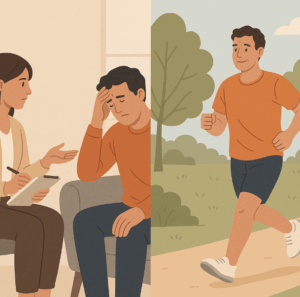🌿 Treating Anxiety Without Medications: Therapy and Exercise That Work
 Anxiety is among the most common mental health conditions worldwide, affecting millions of people across all age groups. While medications such as SSRIs and benzodiazepines are often prescribed, many patients either prefer to avoid medicines or do not respond fully to them.
Anxiety is among the most common mental health conditions worldwide, affecting millions of people across all age groups. While medications such as SSRIs and benzodiazepines are often prescribed, many patients either prefer to avoid medicines or do not respond fully to them.
Fortunately, therapy and exercise are proven, evidence-based strategies that can reduce anxiety symptoms significantly. In fact, multiple studies show that non-medical approaches can be as effective as medications in mild to moderate anxiety — and even enhance outcomes when used alongside pharmacological treatment.
🧠 Therapy Approaches for Anxiety
1. Cognitive–Behavioural Therapy (CBT)
-
What it is: CBT helps patients identify unhelpful thought patterns (e.g., catastrophising, “what if” thinking) and teaches practical coping skills.
-
Method: Involves cognitive restructuring and exposure and response prevention (ERP), gradually reducing avoidance behaviours.
-
Evidence: Meta-analyses show CBT is the gold standard for anxiety, with effect sizes comparable to medication.
2. Mindfulness-Based Therapy (MBCT, MBSR)
-
What it is: Training the mind to focus on the present moment without judgment, reducing worry and rumination.
-
Method: Meditation, mindful breathing, and body scan exercises.
-
Evidence: Randomised controlled trials show mindfulness-based interventions significantly reduce generalised anxiety and relapse rates.
3. Acceptance and Commitment Therapy (ACT)
-
What it is: ACT teaches acceptance of unpleasant emotions while committing to actions guided by personal values.
-
Method: Focus on psychological flexibility rather than symptom suppression.
-
Evidence: Studies show ACT is effective in chronic anxiety and comorbid depression, with long-lasting gains.
4. Exposure Therapy (Systematic Desensitisation)
-
What it is: Step-by-step exposure to feared situations in a safe environment.
-
Method: Gradual hierarchy (e.g., for social anxiety → short conversation → group speaking).
-
Evidence: Large-scale trials confirm exposure therapy is highly effective in phobias and panic disorder.
5. Supportive Therapy and Psychoeducation
-
What it is: Emotional support, reassurance, and teaching stress management.
-
Method: Non-directive therapy, patient education, lifestyle counselling.
-
Evidence: While not curative alone, supportive therapy improves treatment adherence and quality of life when combined with structured approaches.
🏃♂️ Exercise as Medicine for Anxiety
1. Aerobic Exercise
-
What it is: Running, cycling, brisk walking, swimming.
-
Method: At least 30 minutes, 4–5 times per week.
-
Evidence: Harvard and Duke University trials show aerobic exercise is as effective as antidepressants in mild to moderate anxiety and depression.
2. Yoga
-
What it is: Combines postures, controlled breathing, and meditation.
-
Method: Regular practice of asanas, pranayama, and relaxation.
-
Evidence: RCTs in India and globally show yoga reduces GAD symptoms and cortisol levels, improving stress resilience.
3. Strength Training
-
What it is: Resistance exercises using weights or body weight.
-
Method: 2–3 sessions per week targeting major muscle groups.
-
Evidence: Systematic reviews find strength training reduces trait anxiety and improves mood stability.
4. Breathing Exercises & Relaxation
-
What it is: Diaphragmatic breathing, progressive muscle relaxation (PMR).
-
Method: Slow abdominal breaths, tension–release of muscle groups.
-
Evidence: Clinical studies show PMR reduces anxiety scores in medical and psychiatric patients.
5. Mind–Body Activities
-
What it is: Tai Chi, Qigong, Pilates, mindful walking.
-
Method: Gentle, rhythmic movements combined with focus and breathing.
-
Evidence: Research from Asian and Western cohorts confirms improved anxiety, balance, and sleep.
⚖️ Therapy + Exercise: A Holistic Approach
-
Therapy retrains the mind → addressing thought patterns, fears, and avoidance behaviours.
-
Exercise retrains the body → lowering stress hormones, improving sleep, boosting confidence.
-
Together, they provide sustainable relief from anxiety without over-reliance on tablets.
💡 Key Takeaway
Anxiety can be effectively managed without medications. Evidence strongly supports CBT, mindfulness, ACT, exposure therapy, and supportive therapy, alongside aerobic exercise, yoga, strength training, and relaxation practices. These approaches are safe, empowering, and promote long-term well-being.
👨⚕️ Consultation
I’m Dr. Srinivas Rajkumar T, Consultant Psychiatrist at Apollo Clinic, Velachery, Chennai.
If you or a loved one is struggling with anxiety and prefer non-medication strategies, I provide structured therapy and lifestyle guidance tailored to individual needs.
📞 Contact: +91 8595155808